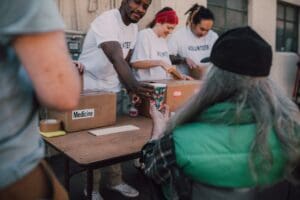By: LINDSEY TOOMER
For a few hundred members of Denver’s unhoused population, the Denver Basic Income Project has provided an opportunity for stability they haven’t been able to secure on their own.
Mark Donovan, founder of the Denver Basic Income Project, said the project intends to explore the impact direct cash assistance can have on encouraging “a healthier society centered around human thriving.”
“We believe that providing an income floor with these cash transfers creates the foundation upon which people can advance toward whatever the next step is for them in their life,” Donovan said.
GET THE MORNING HEADLINES DELIVERED TO YOUR INBOXSUBSCRIBE
In November, the DBIP started its full-scale operations providing no-strings-attached funding to 820 people across three cohorts. The DBIP raised over $8.3 million to support its efforts, including funding from the city of Denver, the state of Colorado, grants and other donors. The University of Denver’s Center for Housing and Homelessness Research is also running a randomized controlled trial in conjunction with the project to get data on how well it works.
The three cohorts were randomly assigned as part of the research: 260 participants receive $1,000 a month for 12 months, another 260 received $6,500 up front and then $500 a month for the remaining 11 months, and the last group of 300 people is the control group, receiving $50 a month to complete a survey so the project has a solid baseline for comparison. Participants also receive a cell phone with service paid off for the 12 months they’re in the program.
The project has gone through some phases, including a soft launch in August 2021 with 11 participants and another in July 2022 with 28 participants. Donovan said the soft launches were intended to help the DBIP team understand what would be needed to run the program at scale.
While alcohol and drug abuse are more common among the homeless population than the general population, Donovan said a similar basic income project in Toronto showed a 39% reduction in spending on goods like alcohol, drugs and cigarettes among participants in the program. He said there are many circumstances that can lead one to homelessness and that “we need to drastically scale up the programs that have proven successful in supporting our most vulnerable neighbors.”
Feeling stable
Chantel Palmer participated in the first soft launch, receiving $1,000 a month for 12 months from August 2021 through July 2022. As a single mother of two who has found herself in transitional housing for several years, the direct cash assistance gave her the opportunity to save for an apartment and a car, and work toward her college degree.
Palmer lives in a transitional housing center in Denver designed for families, and before the DBIP, her only income was $400 a month from the Temporary Assistance for Needy Families government assistance program while she was taking classes full time. She said she was barely getting by until the DBIP started.
“For the first time in a long time I felt stable, like I could fully provide for myself and my children and not worry about having enough food or being able to put gas in the car or pay our bills or whatever,” Palmer said. “I knew this money was coming, I knew that I could count on that, and it was a huge stress relief for me as a single parent.”
Palmer also said it was the first time she was ever able to put some money to the side for her and her kids. While she said she has a bit more anxiety now that the payments have stopped, she was able to save enough to push herself through until she finds an apartment.
For the first time in a long time I felt stable, like I could fully provide for myself and my children and not worry about having enough food or being able to put gas in the car or pay our bills or whatever.
– Chantel Palmer
Donovan said the project intentionally didn’t require those involved to participate in the research as “a statement of respect and trust,” but 95% of the participants voluntarily opted into the research. He said the results of the research will be valuable since there is not a lot of data supporting the basic-income concept.
“We need to do this together to show that this works and people want to make this something that we can expand and deliver to more people, and so it’s really exciting to be building that kind of community and trust,” Donovan said.
Donovan said the research will analyze 11 different factors including housing stability, physical and psychological health and financial well being and assess how the direct cash payments influence these factors. When determining who would participate in the project, Donovan said a key goal was to ensure their sample is representative of the homeless population rather than of the general population.
“We committed to being inclusive and representative in that way and our numbers have lined up really well, and that was intentional with the way we chose partners to work with,” Donovan said.
At first, Palmer was nervous about how the new income would impact her Medicaid and other government benefits, as those are essential to her survival while she remains low-income. She said her food assistance and TANF funding weren’t impacted, but her Medicaid benefits went from a $0 copay to a $3 copay. Palmer also said while she appreciates the no-strings-attached concept of the program, she would like to see a bit more education and oversight for participants when it comes to budgeting and learning how to save and spend wisely.
Community collaboration
The DBIP is made possible thanks to the multiple community-based organizations supporting the program’s on-the-ground work, including the Delores Project, Rocky Mountain Human Services, the Salvation Army, and the Colorado Coalition for the Homeless. These organizations help those interested in the DBIP with applications, enrollment and continued support throughout their time with the program.
Aubrey Wilde is the advocacy program director at the Colorado Coalition for the Homeless, often working on special projects the Coalition takes on, such as voter registration, census outreach and the DBIP. She said the Coalition first started working with the DBIP in early 2021, sharing background information on Denver’s homelessness landscape to help shape the program.
With barriers like the high cost of living and low wages in Denver, the Coalition sees people struggling to find a path to stability, and the DBIP is a “thoughtful and strategic way” to get some people experiencing homelessness the additional support they need, Wilde said.
“This is a really important project because direct cash assistance is a powerful, immediate way to reduce wealth inequality and begin building a healthier society that’s grounded in social justice,” Wilde said. “It’s a different way of assisting people that recognizes that people typically know what’s best for themselves and how to support themselves and their families.”
The Coalition takes a housing-first approach to its work, Wilde said, and most of the participants she’s spoken with said their top priority for the money is to save up for an apartment. Wilde said the collaboration among the variety of community-based organizations is what has made the project a success so far, and she hopes to see it inform additional basic income projects on the state or federal level.
When clients have to navigate the way systems are set up, it can be very undignified and can be very discouraging having to jump through so many hoops to obtain some sort of service or benefit.
– Maria Sierra
Maria Sierra is a community liaison with the DBIP who has worked to serve homeless families in Denver for almost 30 years, mostly in transitional housing spaces. When the project was just getting started, Sierra helped project leaders understand the service provider perspective based on her experience.
To Sierra, the DBIP is dignifying because it places trust in the participants to know what’s best for themselves. She said it’s been exciting to see participants use the money they’re getting for exactly what the DBIP hoped they would use it for.
“When clients have to navigate the way systems are set up, it can be very undignified and can be very discouraging having to jump through so many hoops to obtain some sort of service or benefit,” Sierra said.
Sierra used to work at the transitional housing center where Palmer resides, which is how Palmer was initially connected to the program. Palmer said she is grateful that the funding she received from the program also improved her bond with her kids and family.
“We were finally, for the first time in a long time, able to spend a little bit of extra money and go to the movies together or go out to eat or things that normally we just can’t do because it’s not in our budget,” Palmer said. “But then also, just knowing my bills are paid and I don’t have to struggle every month trying to figure out what I can pay this month, what I can not pay this month. I even paid off my rent through the end of the year last year, because I could.”
Many of the participants Sierra has worked with said they feel like they’ve won the lottery by being accepted into the program. She was also pleasantly surprised to see how many people opted into the research because they want to see this make a difference and expand.
“I desire for people to not be navigating systems and just being on surviving mode,” Sierra said. “I hope for people to be thriving, and I feel like we’re starting to see that.”



















